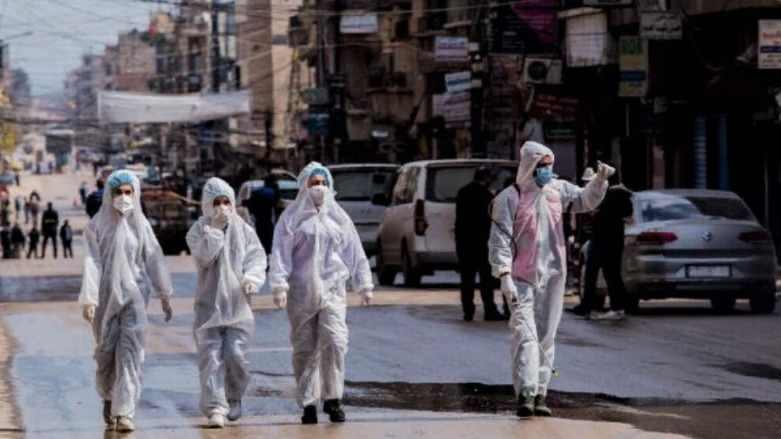Northeast Syria ‘overwhelmed’ by COVID-19 spike, test shortage

ERBIL (Kurdistan 24) – The Kurdish-led Autonomous Administration of North and East Syria (AANES) warned on Thursday that the combination of elevated coronavirus infection numbers and a scarcity of kits to test for the deadly disease are making an already dire health situation far more extreme.
“Because we have to do daily a lot of tests due to an increase in COVID-19 cases, the area is overwhelmed and there is a low number of COVID-19 tests,” administration spokesperson Luqman Ahmi told Kurdistan 24.
Ahmi called on the World Health Organization to provide COVID-19 vaccines directly to northeast Syria rather than through Syrian government institutions. “These vaccines if supplied directly to AANES will be much better in fighting against coronavirus than waiting for Syrian regime plans to monopolize or provoking the self-administration.”
The official also accused Turkey of cutting off water to the Euphrates river and the Alouk water station. “Everyone knows in such a period there is a need for clean water and sanitation to avoid more COVID-19 cases. This can be considered a war that the Turkish state wages against the administration.”
His concerns echoed warnings included in an International Rescue Committee (IRC) report released two days earlier that highlighted a significant shortage of both testing supplies and oxygen across northeastern Syria.
“The COVID lab in Qamishlo – which is the only COVID-19 lab run by the Self Administration in the northeast – could be forced to stop COVID testing in less than 7 days due to a critical shortage of RNA extraction kits,” the report read, adding, “This would have a devastating impact on testing capacity, with health professionals no longer able to identify new cases, track trends, or gain an understanding of the true spread of the disease – just as cases are surging.”
According to the IRC, the current known COVID-19 case count for northeast Syria now stands at 15,546. In April, over 5,300 new infections have been confirmed – more than half of the total for the whole of 2020.
Administration health authorities told the local Hawar News Agency (ANHA) on Thursday that, even with the dearth of testing capabilities, 123 new coronavirus cases were confirmed. Although it is a relatively low number on its face, the percentage of total tests given is extremely high, suggesting the true numbers are far higher.
The IRC report continued, “46 percent of tests have come back positive over the past 7 days – indicating that, even with the lab currently operational, not enough tests are being carried out, which highlights the extreme fragility of the health system in northeast Syria.”
In addition to the urgent need for more testing supplies, COVID-19 treatment facilities in the region are overstretched - many are already at capacity after seven were forced to close their doors in March due to a lack of funding, with a further six now also at risk.
Moreover, there is now an acute shortage of oxygen in the eastern city of Deir al-Zor. At least one hospital has announced that it is running out of medicines, with management worried that it may need to be shuttered as well if they are not soon replenished, the report explained.
Misty Buswell, Policy and Advocacy Director for the IRC in the Middle East and North Africa, said: “Testing capacity in the northeast has never been sufficient, and now it may be lost altogether. To date, only 41,500 tests have been carried out in the region and if the lab in Qamishlo is no longer able to test, then the ability to control the spread of the virus in northeast Syria will be seriously compromised.”
“Although the first doses of the vaccine have arrived in Syria, less than 100,000 have been allocated for the northeast, which is far too few to cover all frontline health workers and those most at risk in the region.”
Last month, over 100 civil society organizations and institutions in northeastern Syria expressed concerns that the number of vaccine doses allocated to the northeast will not be enough for an area with more than 5 million people and that primary access will be given to the Syrian regime rather than the local Kurdish-led authorities there.
“As things stand, we do not know when these doses will reach the northeast but, although they will not be a silver bullet, they cannot get there soon enough,” concluded Buswell.
“Currently, 83 percent of patients who receive invasive ventilation in the region are not surviving and we fear that things will only get worse. Treatment facilities are being forced to close due to a lack of funding, oxygen is beginning to run out, and COVID cases are reaching the highest levels seen to date. The health system is struggling to cope, and the situation is deteriorating extremely rapidly.”
Editing by John J. Catherine
